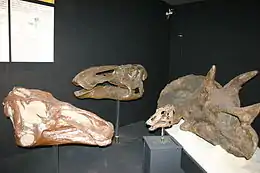Cerapoda
Cerapoda ("ceratopsians" and "ornithopods") is a clade of the dinosaur order Ornithischia, that includes ceratopsians, ornithopods and pachycephalosaurs.
| Cerapoda | |
|---|---|
 | |
| Skulls of cerapod dinosaurs | |
| Scientific classification | |
| Kingdom: | Animalia |
| Phylum: | Chordata |
| Clade: | Dinosauria |
| Order: | †Ornithischia |
| Clade: | †Genasauria |
| Clade: | †Neornithischia |
| Clade: | †Cerapoda Sereno, 1986 |
| Subgroups | |
Classification
Cerapoda is divided into two groups: Ornithopoda ("bird-foot") and Marginocephalia ("fringed heads"). The latter group includes the Pachycephalosauria ("thick-headed lizards") and Ceratopsia ("horned faces"). The following taxonomy follows Richard J. Butler, Paul Upchurch and David B. Norman, 2008 (and Butler et al., 2011) unless otherwise noted.[1][2]
Cerapoda was first named by Sereno in 1986 and defined by him as "Parasaurolophus walkeri Parks, 1922, Triceratops horridus Marsh, 1889, their most recent common ancestor and all descendants".[1] The cladogram below follows a 2011 analysis by paleontologists Richard J. Butler, Jin Liyong, Chen Jun and Pascal Godefroit.[2]
| Cerapoda |
| ||||||||||||
References
- Richard J. Butler; Paul Upchurch; David B. Norman (2008). "The phylogeny of the ornithischian dinosaurs". Journal of Systematic Palaeontology. 6 (1): 1–40. doi:10.1017/S1477201907002271.
- Richard J. Butler; Jin Liyong; Chen Jun; Pascal Godefroit (2011). "The postcranial osteology and phylogenetic position of the small ornithischian dinosaur Changchunsaurus parvus from the Quantou Formation (Cretaceous: Aptian–Cenomanian) of Jilin Province, north-eastern China". Palaeontology. 54 (3): 667–683. doi:10.1111/j.1475-4983.2011.01046.x.
- Butler, R.J. (2005). "The 'fabrosaurid' ornithischian dinosaurs of the Upper Elliot Formation (Lower Jurassic) of South Africa and Lesotho". Zoological Journal of the Linnean Society. 145 (2): 175-18. doi:10.1111/j.1096-3642.2005.00182.x.
- Sereno, P.C. (1986). "Phylogeny of the bird-hipped dinosaurs (order Ornithischia)". National Geographic Research. 2 (2): 234–56.
